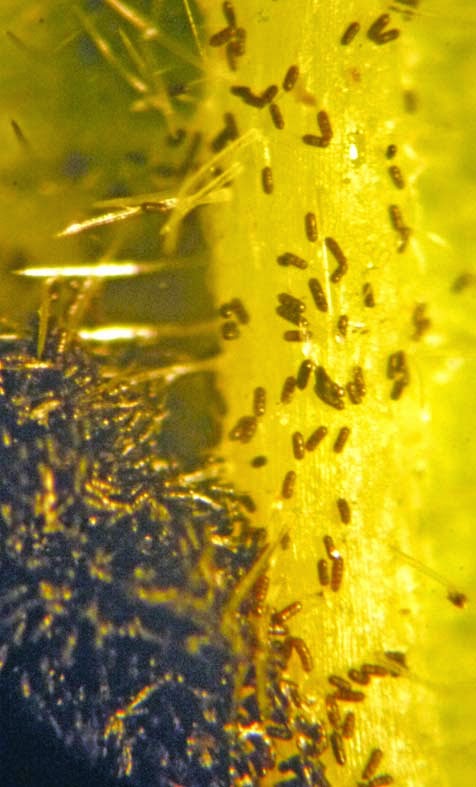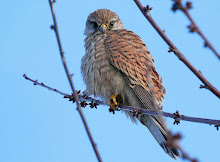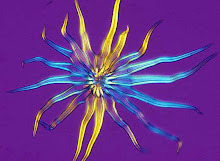The fungus initially develops within the green leaf, causing purple patches, but when the leaf begins to die and loses its chlorophyll this vibrant 'plums and custard' colour scheme turns the leaves into some of the brightest objects in the hedgerow in early winter.
These clusters of spores erupt through the underside of the leaf as it begins to die.
The individual spores are just about visible with a camera macro lens but for a clear view you really need a microscope.
These are the individual spores viewed at about x20 with a low power stereomicroscope, and .....
.... here they are seen though a compound microscope at a magnification of around x100, showing their very distinctive club-shaped structure, with 4-5 spores on a stalk.
In Victorian times rust fungi were popular, easily accessed
subjects for amateur microscopists and in 1870 the somewhat eccentric
naturalist Mordecai Cubitt Cooke devoted a whole book, entitled Rust,
Smut, Mildew and Mould: An Introduction to the study of Microscopic Fungi, to
their study. It’s hard to imagine such a title attracting many buyers now but
in Cooke’s day, without thedistractions of television, radio and the internet,
microscopy was a very popular pastime and the book ran through four editions in
20 years.
Mordecai Cubitt Cooke
[public domain image, source http://tinyurl.com/ohkryyc]
![[rust1.jpg]](https://blogger.googleusercontent.com/img/b/R29vZ2xl/AVvXsEh3rQih89TLacN-G0aVZM484Eu8MHMx4Z9DIrBdbJZKTNl8gRjcBseWrhWR3kS6AkAAo3erdjnAOLmVQQhB_pZ-cp6TnNGRM-nISM2OQwBaE_ouQEjgmxe1kTfdVQ0VOI8TnnbaK7Wg9tq2/s640/rust1.jpg)
Cooke was evangelical when it came to promoting the delights
of microscopy, opening his first chapter with the confidant assertion that “everyone
who possesses a love for the marvellous, or desires a knowledge of some of the
minute mysteries of nature, has, or ought to have, a microscope.” In his
day the lady of the house would be perfectly happy for her husband to retreat
to his study for a close look at smut – or rusts, mildew and mould – in the knowledge
that he would be advancing the cause of science.
![[rust2.jpg]](https://blogger.googleusercontent.com/img/b/R29vZ2xl/AVvXsEhu7w9aRHm_TWozMhyL_62nS5YznldU4gUNMuCAK1zyEiNYNLNacTlsvlkozzqVkZF0JxZANth_iLMb4ZFIsNAFkalxS5ibgklJihjNHcGDcy3z8xICqH-KEIaWMAKiXOzASi6KKwfKTMPV/s640/rust2.jpg)





























I really enjoyed this post and the images therein. I think I should like to have a microscope.
ReplyDeleteYou might enjoy exploring this web site, Toffeeapple http://www.microscopy-uk.org.uk/
DeleteIt's full of interesting images, and practical advice if you fancy having a go
Thank you for the link, I shall investigate.
DeleteWell,well..! Shutting himself up to view smut!
ReplyDeleteDeplorable, isn't it!
DeleteThis comment has been removed by the author.
ReplyDeleteIf you haven't already read it you might enjoy Lynn Barber's The Heyday of Natural History (Jonanthan Cape 1980) which is full of stories about eccentric Victoriannaturalists
DeleteThis comment has been removed by the author.
Delete